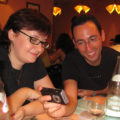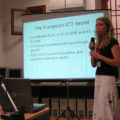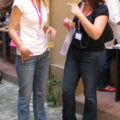They say it’s always darkest before the dawn. I’ve just been through a dark period, but… here comes the sun! (In more ways than one, as will shortly become clear.)
I’ve been stressed and depressed since well before Christmas. Money (lack of) was becoming a problem. TVBLOB is a privately-financed start-up, and my salary there is low – working for so little has been my investment in the company, at my personal risk: there are no guarantees that what we’re doing will fly and, if it doesn’t, I will have practically thrown away all these years (financially – experience, of course, is always valuable).
I don’t care about being wealthy by anyone else’s standards. Thanks to my husband and his family, I have a very nice roof over my head. But I don’t like feeling that I’m not pulling my financial weight in the family (though we have the basics covered, my salary is needed). Worse, feeling that I’m losing my financial independence eats away at me.
Furthermore, my daughter wants to go away to school next year, to Woodstock, my alma mater – which has become a great deal more expensive since I attended it: $16,000 for tuition and boarding, plus airfares, a new laptop, and other sundries that a teenager abroad will need. This adds up to approximately my annual salary at TVBLOB. <wince>
So, I have to somehow at least double my current salary. I’m not in a hurry to leave TVBLOB: although, after four years, start-up mode is getting very old, the project is still absolutely fascinating and potentially world-changing. That, plus colleagues whom I like and respect very much, is hard to walk away from.
But, financially, I wasn’t sure I had any other option. I started looking around for other full-time jobs in high tech in Italy (Google? hmm), but – am I actually employable by any “normal” Italian company? I have no personal experience to go on, but I have heard that most Italian companies are more gerontocracies than meritocracies (and chauvinist, to boot).
Job ads in the Italian papers specify that they want someone young (yes, this is legal in Italy), so they can pay them miserably and keep them low on the totem pole. Many entry-level jobs across all industries are being done by low- or un-paid interns with the excuse: “you can afford to work for us just for the experience – you live at home with your parents anyway.”
I fear that a middle-aged foreign woman who’s inclined to speak her mind and wants to be paid what she’s worth is not likely to do well in such a context. The crowd I saw at Cisco Expo the other day confirmed my (possibly mistaken) prejudice that even high-tech companies in Italy tend to favor hierarchy and conformity – I would love to be wrong about this, but am I? I don’t want to find out the hard way.
Where else to look for work, and what kind of work? There’s always the small stuff, like translation, but globalization has depressed prices in that arena as well – most companies are not willing to pay fairly for a really good translation by someone who actually knows how to write in English. I put in a bid here and there, with no immediate result.
Because I have a director title at TVBLOB, I felt uncomfortable at the idea of explicitly advertising that I was seeking additional work. So I brushed up my resumé, trolled LinkedIn for connections and recommendations, and quietly told a few friends that I was in the market.
This has brought results far greater and faster than I ever hoped for. Next Tuesday I’m flying to Colorado to start part-time, freelance work (one quarter budgeted so far) with Sun Microsystems, as a web producer for one section of their vast online empire, among other tasks. After this initial visit, I’ll be able to work from home (though I won’t mind travel as needed – I’m generally happy to go places and see people).
I’m slightly terrified. I know all about building and sustaining online communities, and writing, managing and editing web content – in fact, I was one of the pioneers in corporate online communication. But the subject matter of the Sun storage site I’ll be supervising is hardly an area of expertise for me.
On the other hand, I didn’t know anything about CD-ROMs when I set out to write a book on them: I am very good at learning what I need to know (and enjoying doing so), when I need to know it. And there’s more than one former colleague in the group I’ll be working with – a bonus to the whole situation. It won’t be easy but, if it was, I’d get bored!
I’ll keep my TVBLOB job, four days a week instead of five (in lieu of the raise that they can’t afford to give me right now, the lack of which started all this), so I have the remaining hours in the week to work for Sun, maintain my site, and, oh, yes, have a personal life from time to time. I’m heading into a very busy period now, but I’m happier than I have been in months. Turns out there was Sunlight at the end of the tunnel.






